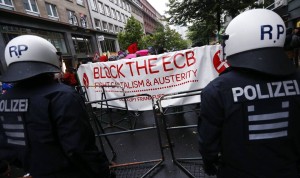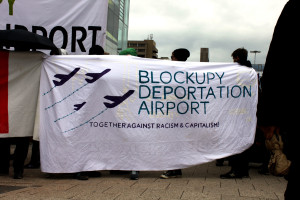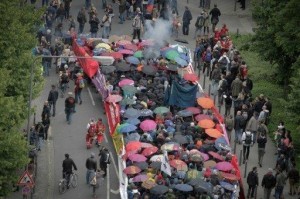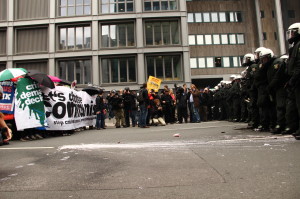Thousands of protesters from all over Germany and many European countries joined this year’s two-day Blockupy protest in Frankfurt (May 31st/June 1st). But the main demonstration was crushed by hours-long kettling and police violence – resulting in a wave of solidarity with the protest. Here’s a quick report for our comrades abroad, written by the media group of the umsGanze! alliance. A thorough political assessment will follow.
What’s Blockupy?
The concept of “Blockupy” emerged in 2011/12 as a mix of grassroots mobilization, traditional networking and the idea of a metropolitan strike or mass blockade. From the start, its perspective has been transnational, trying to counter nationalist tendencies in the European crisis regime, and to connect protests in different countries. Blockupy is organized by a broad alliance of reformist and anti-capitalist groups, networks, some unions and small parties. It went public in May 2012 with three days of action in Frankfurt, the seat of the ECB. Authorities responded with large scale repression against any kind of rally or gathering, and shut down the entire city centre with road blocks and thousands of riot police. Their aim was to discourage and criminalize protesters, so Frankfurt and the ECB wouldn’t become a “protest Mecca”. After massive breaches of civil rights, 1500 arrests and a successful occupation of the main city square “Römer”, about 25.000 turned out for Germany’s largest anti-austerity demonstration to date.
In 2012, umsGanze! hadn’t been a formal member of the Blockupy network. Instead, we were focusing on our “M31 – International Day of Action against Capitalism” on March 31st. Nonetheless, we contributed with infrastructure, discussion events and an anti-capitalist block at the demo, jointly organized with the Interventionistische Linke (iL) alliance (Some impressions). This year, we’re a member of the coordinating committee. We’ve worked hard to emphasize an anti-capitalist perspective of the protest, and to counter simplistic interpretations of the crisis. At the core of the problem is capitalism itself, as a system pervading all aspects of society – and not just “greedy bankers” or the infamous “1%” the Occupy movement denounces. At least for the moment we can say that this effort has payed off. Blockupy is still a heterogeneous network. But there is a clear focus against capitalism in general, as a system of exploitation and social domination.
Compared to other European countries, these protests are still small. Most Germans are proud to be part of the “strongest economy” in Europe. According to the official narrative, Germany had “done its homework soon enough” by introducing neoliberal austerity measures even before the crisis broke out. Government and most opposition parties are desperately looking for a formula to save capitalism against its inherent tendencies for crises. “Improving competitiveness” is the order of the day – intensified competition, with all its devastating effects in Europe and in Germany itself. As usual, German unions failed to show any solidarity with wage-labourers in other European countries. On a grassroots level, many initiatives are organizing resistance against these policies, most notably in the field of housing/gentrification. But we’re still far from a full scale social movement that would challenge the capitalist rationale itself. Blockupy is a significant effort in that direction, if anti-capitalists continue to engage.
Blockupy 2013
 In 2013, Blockupy returned to Frankfurt with a two-day program of blockades and a large demonstration (May 31st/June 1st). After a successful mobilization of Blockupy platforms in many cities, thousands of protesters gathered from all over Germany and many European countries in a large “Camp Anticapitalista” with great infrastructure.
In 2013, Blockupy returned to Frankfurt with a two-day program of blockades and a large demonstration (May 31st/June 1st). After a successful mobilization of Blockupy platforms in many cities, thousands of protesters gathered from all over Germany and many European countries in a large “Camp Anticapitalista” with great infrastructure.
Day one started early with a march of some 3000 protesters against a barbed-wired ECB. We were able to reach and damage the inner line of defence police had set up, and blocked the complex for many hours. In the afternoon, groups gathered for de-centralized protests to “mark crisis actors”. The great variety of targets and issues raised reflects a broader understanding of crisis and resistance: neoliberal service and care work providers, extra-exploitative retailers, employment centres, banks involved in food speculation and land-grabbing, and so on.
Blockupy Deportation Airport
 UmsGanze! mobilized against Frankfurt International Airport, Germany’s main deportation airport, and an essential hub of the European deportation regime. We wanted to highlight the German and European war against refugees, and discriminatory migration policies driven by economic opportunism and racist ideology (Interview and some impressions). About 700 protesters joined the rallies there, blocking the main terminal building and a major commuter transit section. Authorities had tried to prevent a demonstration inside the actual airport building, but a court ruling had dismissed their ban, granting access to a limited number of 200 demonstrators. (According to a constitutional court ruling, the airport is considered a “public space”, and thus open for demonstrations.) Still, hundreds of riot police tried to block us, resulting in an hours-long stand-off in front of the main entrance, and some hard scuffles. Eventually, the delegation of 200 was let in for a loud demonstration with many speeches. We were tightly surrounded but unimpressed by aggressive police. Speeches were held by self-organized refugee initiatives, antiracist groups and Roma activists. At the same time, another 200 protesters defended their blockade in the transit section against any police attempt to clear them out. Returning downtown, protesters split into two spontaneous marches through different parts of the inner city. With Blockupy Deportation Airport, we were able to highlight the links between capitalist competition and racist migration control. And we were able to interrupt the workings of the airport quite a bit. But it obviously takes a broader effort to obstruct the deportation regime.
UmsGanze! mobilized against Frankfurt International Airport, Germany’s main deportation airport, and an essential hub of the European deportation regime. We wanted to highlight the German and European war against refugees, and discriminatory migration policies driven by economic opportunism and racist ideology (Interview and some impressions). About 700 protesters joined the rallies there, blocking the main terminal building and a major commuter transit section. Authorities had tried to prevent a demonstration inside the actual airport building, but a court ruling had dismissed their ban, granting access to a limited number of 200 demonstrators. (According to a constitutional court ruling, the airport is considered a “public space”, and thus open for demonstrations.) Still, hundreds of riot police tried to block us, resulting in an hours-long stand-off in front of the main entrance, and some hard scuffles. Eventually, the delegation of 200 was let in for a loud demonstration with many speeches. We were tightly surrounded but unimpressed by aggressive police. Speeches were held by self-organized refugee initiatives, antiracist groups and Roma activists. At the same time, another 200 protesters defended their blockade in the transit section against any police attempt to clear them out. Returning downtown, protesters split into two spontaneous marches through different parts of the inner city. With Blockupy Deportation Airport, we were able to highlight the links between capitalist competition and racist migration control. And we were able to interrupt the workings of the airport quite a bit. But it obviously takes a broader effort to obstruct the deportation regime.
Mass Demonstration and Police Violence
 For the second day, a mass demonstration was planned in downtown Frankfurt, and about 15.000 turned out. Our anti-capitalist block was to lead the way – 1500 strong, with many comrades from Italy, and once more organized together with iL. In the run-up, authorities had tried to prohibit our route passing the current ECB tower, only to have their orders overruled in court. But sure enough, cops found their reason – a firecracker – to kettle most of our block after half a mile with massive force, and thus stopping the entire demo before it even started. What followed was an outrageous breach of civil rights, and an hours-long orgy of unprovoked police violence. And that’s not just our opinion. All media including conservative papers and the yellow press are consistently reporting those abuses. Many journalists and parliamentary observers fell victim to tear gas, baton attacks, and verbal intimidations. Paramedics were prevented to help the injured. Many of them have submitted written testimonies. (6)
For the second day, a mass demonstration was planned in downtown Frankfurt, and about 15.000 turned out. Our anti-capitalist block was to lead the way – 1500 strong, with many comrades from Italy, and once more organized together with iL. In the run-up, authorities had tried to prohibit our route passing the current ECB tower, only to have their orders overruled in court. But sure enough, cops found their reason – a firecracker – to kettle most of our block after half a mile with massive force, and thus stopping the entire demo before it even started. What followed was an outrageous breach of civil rights, and an hours-long orgy of unprovoked police violence. And that’s not just our opinion. All media including conservative papers and the yellow press are consistently reporting those abuses. Many journalists and parliamentary observers fell victim to tear gas, baton attacks, and verbal intimidations. Paramedics were prevented to help the injured. Many of them have submitted written testimonies. (6)
Police tried to stir the rest of the demo to an alternative route of their choosing, but everyone remained on the spot in solidarity. After hours of standstill, those kettled were ordered to surrender, to be searched and registered. We obviously didn’t comply, so police had to try and pull us out individually. It took them three hours to reach our speaker truck, and six to clear the entire block. In the process, more than 300 demonstrators were injured. When the block was finally cleared around 10pm, 4000 remaining protesters held a closing rally and formed a spontaneous demo to return to the camp.
 Video footage and testimonies prove that the police assault was pre-planned, striking at the only spot possible for such an action, with hundreds of robocop officers lined up. We’re not naive about civil rights and the rule of law. But such a blatant breach of the constitution is pretty dangerous. For an authoritarian society, you don’t need a blood-thirsty dictator. All it takes is an authoritarian douche bag as Interior Minister, and a public that’s willing for any sacrifice, as long as it serves the national economy. Liberals and Greens, claiming to be civil rights watchdogs, are securing parliamentary majorities for these policies. The Mayor of Frankfurt, a Social Democrat, is avoiding any public statement. Politics and most institutions are geared towards neoliberalism. To them, any alternative society is inconceivable, and anyone advocating it must be nuts.
Video footage and testimonies prove that the police assault was pre-planned, striking at the only spot possible for such an action, with hundreds of robocop officers lined up. We’re not naive about civil rights and the rule of law. But such a blatant breach of the constitution is pretty dangerous. For an authoritarian society, you don’t need a blood-thirsty dictator. All it takes is an authoritarian douche bag as Interior Minister, and a public that’s willing for any sacrifice, as long as it serves the national economy. Liberals and Greens, claiming to be civil rights watchdogs, are securing parliamentary majorities for these policies. The Mayor of Frankfurt, a Social Democrat, is avoiding any public statement. Politics and most institutions are geared towards neoliberalism. To them, any alternative society is inconceivable, and anyone advocating it must be nuts.
We haven’t even started yet!
Now there are two options: Either we succeed in uniting social protest initiatives, and give every struggle an anti-capitalist edge; or we’ll live and die in an all-embracing austerity regime, a friendly police state where anything goes – as long as it serves the national economy. For once, public opinion seems to be on our side. The media continues to report police abuses, parliamentary commissions are grilling police chiefs and the regional Interior Minister, fashion designers are publishing “Blockupy mummery” photo galleries. On short notice, about 8000 turned out for a solidarity march against police brutality. A left-leaning newspaper predicted that our next demo was going to be just one united anti-capitalist block. And so on. But let’s be honest: The vast majority of Germans still rallies behind the national mantra of austerity and competitiveness. And it is clear that capitalism can only be wrestled down in daily struggles, and in a transnational effort. There’s no script for that, and no single strategy to achieve it. Yet there seems to be an opening for a new anti-capitalist narrative in the public sphere. And we’ll certainly do our best to radicalise it.
Solidarity within Blockupy has been strong, against any attempt to divide and criminalize us. In its first résumé, the alliance has made it clear that it was not just fighting against austerity measures, but against capitalism itself: “They want capitalism without democracy, we want democracy without capitalism.” Blockupy already promised to return to Frankfurt in 2014, when the ECB wants to move into its brand new twin tower headquarters. But we’re confident crisis and resistance will hit sooner than that. We’re networking internationally with leftist and emancipatory groups, and we’re very open for exchange and collaboration.
Read more